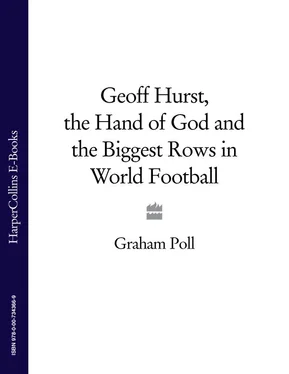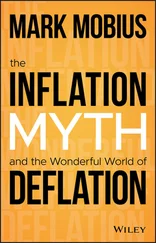Referee Elizondo didn’t do any of that, so perhaps he saw nothing untoward as he ran away from the Italian area. So what about the assistant? Again, sitting at home, I put myself in his position. As the assistant, I would be very grateful to the referee. It was the ref who was selected for the World Cup, so I would know I owed my role on the big day to him and would be in his debt for the rest of my life. I would certainly want to repay him by assisting him to the very best of my ability and by trying to ensure that the match passed without any mistakes. So I would have been very disappointed with myself if I’d missed the head-butt.
The assistant’s job, as the ball was cleared, was to consider whether there was likely to be an offside if the ball was pumped back into the box. He needed to be in line with the second last defender (the last defender was the goalkeeper, don’t forget). And the assistant should have been looking along the line of players. Like the referee, he too should have had a sense, a feeling, when something was about to kick off. Yet, according to FIFA’s statement, it was only the Fourth Official who saw the head-butt.
So I put myself in the shoes—boots rather—of the Fourth Official, Luis Medina Cantalejo, with whom I’d spent some time during my period at that World Cup, and who I liked very much. We went on a couple of bike rides together, to break the monotony of life in ‘camp’ and to help maintain our fitness. He was a good thinker and an interesting talker. He was an upright, very correct man and very experienced. I would have been absolutely delighted if he had been my Fourth Official for any match, including the World Cup Final.
The Fourth Official does not have much to do. One of his duties is to tell the ref if the same player has been cautioned twice but not sent off (as if!). He might also notify the referee if there is a minor altercation between a couple of players. In those circumstances, he would not intervene immediately, but when there is a stoppage he’d say to the ref, ‘You might like to have a word with Zidane and Materazzi. They were at it a minute ago.’ That is good, supportive work from the Fourth Official, quietly helping the referee. But Zidane’s head-butt was much more serious than that and demanded a more vigorous response.
One of the three games my friend Luis had refereed in the 2006 World Cup was the match on 26 June between Italy and Australia—in which he sent off Materazzi. In the Final, if he had seen that same man floored by the world’s greatest player, do you suppose he would have sat around twiddling his thumbs? If it had been me, I would have been straight on my lip mike and said, ‘I say Horacio, there’s been violent conduct out of your view’—or words to that effect. Yet one minute and thirty seconds elapsed after the head-butt while the players were milling around the stricken Italian and Zidane. And, sitting at home in Tring, I thought, ‘Nobody saw it! Nobody can have seen it!’
Perhaps Luis had been doing some paperwork, or talking to the FIFA delegate—as you do—when the head-butt happened. Perhaps he saw something in his peripheral vision, looked up and saw Materazzi on the floor. In those circumstances, I would have expected my experience to have told me from Zidane’s posture that he was the culprit. I would have said to the assistant referee, ‘Did he just hit him?’ And I would have looked at the TV monitor near me for a replay, urgently.
I believe that if I had been the Fourth Official it would have been right to turn to look at the TV, in terms of natural justice and the spirit of football. Zidane and I had a good relationship and I loved refereeing matches in which he played. But he deserved to be sent off against Italy in the World Cup Final. If he had escaped punishment, the World Cup would have ended in farce, because everyone would have known that there had been a major injustice. And think of the implications if, after getting away with his crime, Zidane had scored the winning goal. Certainly, at the time, implications like that would have been going through the minds of every FIFA man and woman at the Final.
At home in Tring, I put myself in all the refereeing roles. I played out all the scenarios in my mind. In my versions, they all ended with the Fourth Official using the TV replay.
What I conclude from the 2006 Final is that, despite FIFA’s protestations about not allowing video replays, technology or anything to intrude on the sanctity of the referee’s decision-making on the pitch, there are times when a more pragmatic approach is called for.
The alternative view is that it would be OK to allow a serious error to be made in a World Cup Final—a mistake which would be known by anyone and everyone watching a television, but not by the referee out there in the middle of the pitch.
Think about the two most flagrant examples of mistakes about goals of recent years, both considered in the previous chapter. They were Reading’s ‘phantom goal’ at Watford on 20 September 2008 (when the ball went wide of the posts yet a goal was awarded) and the incident involving Pedro Mendes of Spurs at Old Trafford on 4 January 2005 (when his shot clearly entered the goal but no goal was given). If something like either of those were to happen in a World Cup Final, surely FIFA should ensure that the Fourth Official was aware of it and that he alerted the referee straightaway, even if that meant not sticking rigidly and pedantically to their rules about using TV replays.
My contention is that FIFA would be sensible and put the credibility of their competition ahead of a narrow-minded adherence to rules. Violent conduct that the referee misses should not be allowed to go unpunished, just as Zidane did not get away with it in 2006. I also believe, 100 per cent, that FIFA should prevent a reoccurrence of what happened to me in 2006—and I suspect that they will never let it happen again.
I accept total responsibility for showing my yellow card three times to Croatia defender Josip Simunic, instead of sending him off after two. But if it happens again to some other poor sap, and if, as in my case, neither of the referee’s assistants nor the Fourth Official realizes, then someone with access to the television coverage will respond. A message will be sent to the Fourth Official, and, through him, to the ref. I am convinced about that, because my mistake caused FIFA such embarrassment.
I have another conclusion from the Zidane scenario and it is this. If we can envisage situations when FIFA would be forced to consult TV replays (even if they look at them surreptitiously) then why pretend otherwise? Why do they say, not only ‘No technology’ but also ‘No experiments on technology’? Why do nothing, when they could really do something open and helpful? It is madness.
QUALIFICATION TOURNAMENT:This was the first World Cup in which the holders were not given automatic qualification to the finals. Germany were guaranteed a place as hosts but 198 teams contested the remaining 31 places.
FINALS:9 June to 9 July. The thirty-two teams were divided into eight groups of four. The eight group winners and the eight group runners-up qualified for three rounds of knockout matches which produced two finalists.
HOSTS:Germany
MASCOTS:Goleo (A lion wearing a Germany shirt with the number 06) and Pille (a talking football)
FINAL:Italy 1, France 1 (after extra-time), Italy won 5-3 on penalties
MATCHES PLAYED:64
GOALS SCORED:147
ATTENDANCE:23,353,655
TOP SCORER:Mirolsav Klose (Germany, 6 goals)
Читать дальше












